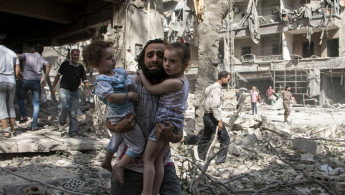Stop barrel bombs in Syria to reduce refugees: HRW
Human Rights Watch has said that stopping the use of barrel bombs in Syria by the government of President Bashar al-Assad will help stem the flow of refugees to Europe.
The human rights organisations argued that efforts have been made to fight the Islamic State group and al-Qaeda affiliated al-Nusra front, but little has been done to stop the atrocities committed by the Assad government.
Assad's government is targeting civilians who live in areas seized by the opposition, hoping to depopulate these areas and to warn other Syrians they will be attacked if the opposition takes control of their neighbourhood.
One weapon it uses is the barrel bomb – a barrel filled with high explosive and metal fragments dropped from a helicopter that cause huge explosions on impact.
Thousands of these bombs have been dropped by the Syrian military on neighbourhoods in, for example, Aleppo, Idlib and Daraa causing extensive death and destruction.
Barrel bombs have played an especially large part in forcing millions of Syrians to leave their country, argued HRW. In particular, Assad's indiscriminate use of them means civilians are unable to move away from the front lines to find safety, as seen in most other wars.
| The UN called for an end to the use of barrel bombs in February 2014, but has done little to stop their use. |
"The international community could probably take no more effective step to curtail the refugee flow than to stop Assad's barrel bombs," said HRW.
However, the human rights organisation argued that little effort has been made to control Assad, especially by Iran and Russia – its main backers – who continue to supply him with weapons.
Western governments have exerted little pressure because they have been preoccupied with other issues – Ukraine in the case of Russia and the nuclear deal in the case of Iran.
The US is currently pressing Russia to coordinate with its own anti-IS operations as Russia deploys its own military force in Syria. However, it has failed to mention barrel bombs.
The EU has focused on tackling the root causes of migration to Europe but has done little to address the issue of barrel bombs.
While the UN called for an end to the use of barrel bombs in February 2014, but has done little to stop their use. Russia is threatening to veto a new UN Security Council resolution proposed by France called for increased monitoring of indiscriminate attacks, including by barrel bombs.
HRW argues that if Russia does veto the proposal, the West should halt any further arms deals with Moscow.
It also argues that the West has failed to increase pressure to stop the use of barrel bombs because it is concerned that weakening Assad's government could lead to a takeover by IS.
"Indeed, far from facilitating the fight against extremist groups, Assad's disregard for civilian life is one of their best recruitment tools," said HRW.
However, IS and the Nusra Front recruit Syrians by presenting themselves as forces that counter Assad's government's atrocities.
HRW argues that a change in leadership does not mean destroying the state – which is needed to prevent a descent into chaos as seen in Iraq and Libya.
It also argues that peace is needed, but while that seems a long way away efforts should focus on protecting civilians by stopping Assad's barrel bombs, which in turn will reduce the flow or refugees to Europe.



